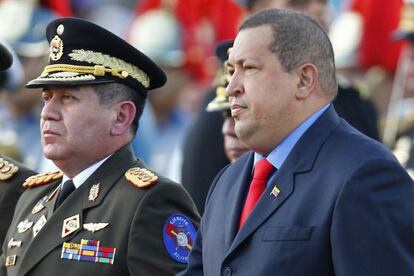Venezuela’s Chávez replaces controversial defense minister
US government designated Rangel Silva in 2008 as FARC collaborator and drug trafficker

More than four years after the US government named him as an official collaborator with terrorists and drug traffickers, Venezuelan Defense Minister Henry Rangel Silva stepped down on Monday to reportedly run in a regional race next year.
President Hugo Chávez made the announcement via a teleconference transmitted on state broadcaster Venezolana de Televisión. Chávez, who won a fourth term last month, said he was replacing Silva with the commander of the navy, Admiral Diego Molero Bellavia, 51, whom he described as a "revolutionary, socialist and anti-imperialist."
For his part, Molero issued a statement saying that his "commitment to the Bolivarian revolution and to commander-in-chief Hugo Chávez Frías comes with no conditions."
Rangel Silva, who is said to be one of Chávez's most trusted advisors and plans on running for a state governor's spot, had been designated defense minister earlier this year despite controversy. In 2008, the US Treasury Department's Office of Foreign Assets Control designated him and six other top government officials under the US Kingpin Act as having connections with traffickers and terrorists, mainly with the Revolutionary Armed Forces of Colombia (FARC). Silva and the others are not permitted to enter the United States and the government has frozen any assets they might have in that country.
Before he had been appointed defense chief, Rangel Silva was head of the country's strategic operational command and served as a special liaison between the army and the office of the Venezuelan presidency.
Tu suscripción se está usando en otro dispositivo
¿Quieres añadir otro usuario a tu suscripción?
Si continúas leyendo en este dispositivo, no se podrá leer en el otro.
FlechaTu suscripción se está usando en otro dispositivo y solo puedes acceder a EL PAÍS desde un dispositivo a la vez.
Si quieres compartir tu cuenta, cambia tu suscripción a la modalidad Premium, así podrás añadir otro usuario. Cada uno accederá con su propia cuenta de email, lo que os permitirá personalizar vuestra experiencia en EL PAÍS.
¿Tienes una suscripción de empresa? Accede aquí para contratar más cuentas.
En el caso de no saber quién está usando tu cuenta, te recomendamos cambiar tu contraseña aquí.
Si decides continuar compartiendo tu cuenta, este mensaje se mostrará en tu dispositivo y en el de la otra persona que está usando tu cuenta de forma indefinida, afectando a tu experiencia de lectura. Puedes consultar aquí los términos y condiciones de la suscripción digital.









































